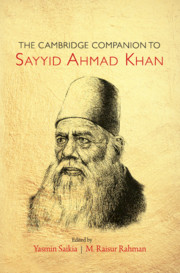Book contents
- Frontmatter
- Contents
- List of Figures
- Notes on Contributors
- Acknowledgements
- A Note on Spellings and Transliteration
- Chronology of Sayyid Ahmad Khan
- Introduction
- Part I Sayyid Ahmad Khan: The rise of a historical figure
- 1 Sir Sayyid on History: The Indian Rebellion of 1857 and Rethinking the ‘Rebellious’ Muslim Question
- 2 Indian Muslims Are the Most Loyal Subjects of the British Raj: Sir Sayyid Ahmad Khan and the Caliphate
- 3 Sir Sayyid on ‘The Present State of Education among Muhammadan Females’
- 4 Naicari Nature: Sir Sayyid Ahmad Khan and the Reconciliation of Science, Technology, and Religion
- Part II Musalman-e Hind: Indian Muslim in a plural environment
- Part III Sir Sayyid today: Enduring legacies
- Conclusion
- Suggested Further Readings
- Index
2 - Indian Muslims Are the Most Loyal Subjects of the British Raj: Sir Sayyid Ahmad Khan and the Caliphate
from Part I - Sayyid Ahmad Khan: The rise of a historical figure
Published online by Cambridge University Press: 26 April 2019
- Frontmatter
- Contents
- List of Figures
- Notes on Contributors
- Acknowledgements
- A Note on Spellings and Transliteration
- Chronology of Sayyid Ahmad Khan
- Introduction
- Part I Sayyid Ahmad Khan: The rise of a historical figure
- 1 Sir Sayyid on History: The Indian Rebellion of 1857 and Rethinking the ‘Rebellious’ Muslim Question
- 2 Indian Muslims Are the Most Loyal Subjects of the British Raj: Sir Sayyid Ahmad Khan and the Caliphate
- 3 Sir Sayyid on ‘The Present State of Education among Muhammadan Females’
- 4 Naicari Nature: Sir Sayyid Ahmad Khan and the Reconciliation of Science, Technology, and Religion
- Part II Musalman-e Hind: Indian Muslim in a plural environment
- Part III Sir Sayyid today: Enduring legacies
- Conclusion
- Suggested Further Readings
- Index
Summary
INTRODUCTION
Currently, the fear and suspicion of Muslim communities, living as minorities in different parts of the world, are growing. In addition, the issues related to ‘caliphate’, ‘Islamic governance’, ‘Islamic state’, and the political and religious loyalties of these communities remain a concern.
In the recent past, a series of scattered events involving Muslims as the perpetrators occurred in different parts of the world. These were highly mediatized. This mediatization polarized the discourses on ‘Islam’. This trend seems to have (re)started after the fall of the Soviet Union and then reinforced by the events of 11 September 2001 – the most recent defining moment for the representation of Islam and Muslim societies.
Just because an organization calls itself the Islamic state, even though most of its victims – in Iraq, Syria, and the neighbouring countries – are Muslims, many people have started believing that all Muslims are members of such organizations. This idea has grabbed the imagination of Western societies, particularly the politicians trying to capitalize on it. Examples of such biased individuals include the members of some ‘liberal’ and ‘freedom’ political parties in the European Union as well as the current US president, Donald Trump, who has shown that immigration, even if legal, is an issue of concern to a large segment of the US electorate. For historians, inflammatory remarks concerning Muslims and migrants of a ‘different’ heritage, recall immigration ‘restrictionists’ whose jingoist rhetoric would have seemed buried for good, but which has not.
Soares and Osella showed that the stereotypes regarding Islam and Muslims have actually been remarkably resilient. The figure of a ‘mad mullah’, who radicalized the ‘uneducated, naïve, but largely benign, Muslim masses’, in nineteenth-century British accounts of Muslim anticolonial politics, or the twentieth-century French accounts of allegedly dangerous ‘Sufis’ and ‘Wahhabis’, who threatened to lead ordinary Muslims in their West African colonies astray. These are the genealogical antecedents of contemporary characterizations of ‘radical’ Islam and Muslims in most Western media, public culture, and even the academic world.
During his time, Sir Sayyid Ahmad Khan also dealt with similar issues. By using his views on the caliphate, in this chapter, I assess how Sayyid Ahmad tried to historically explain the institution of Islam and quell the fears of the British administrators regarding the loyalties of the Muslim community. I also try to establish a parallel with the current events.
- Type
- Chapter
- Information
- The Cambridge Companion to Sayyid Ahmad Khan , pp. 38 - 54Publisher: Cambridge University PressPrint publication year: 2019

